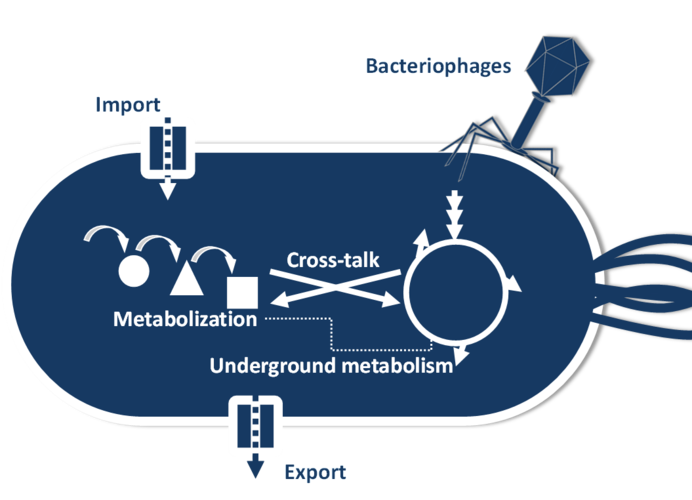Research Interests
Research Projects
An overarching interest in our group is the evolution of bacteria and how it affects important processes such as the regulation of metabolic pathways, gene expression and the interaction of bacteria with bacteriophages.
By targeted genetic modifications in the Gram-negative and Gram-positive model bacteria Escherichia coli and Bacillus subtilis, respectively, we want to find out how bacteria adapt to metabolic imbalances, i.e. how selection pressures can be used to isolate bacteria in which, for example, new metabolic pathways have emerged.
In this way, completely new metabolic pathways can be identified and previously unknown regulatory influences can be revealed.

Currently, we are particularly interested in the detailed characterization of an alternative metabolic pathway that enables B. subtilis to utilize ammonium as a nitrogen source via a fumarate-based metabolic pathway to synthesize the amino acid glutamate (Mardoukhi et al., 2024).
A second topic is the investigation of the interaction between bacteria and bacteriophages, viruses that can specifically infect bacteria. Phages and bacteria have been engaged in a kind of “arms race” for millions of years, with bacteria developing defense mechanisms against phage infections and phages finding ways to circumvent them. The study of co-evolution between bacteria and phages allows exciting insights into evolutionary processes and a better understanding of the mutual adaptation of bacteria and phages. In particular it is essential to understand the processes involved in the formation of resistances in order to be able to use phages safely to combat pathogenic bacteria in the future.
We are currently investigating a restriction-modification system (R-M system) that enables bacteria to distinguish foreign DNA from their own DNA through covalent DNA modifications in order to allow them to enzymatically degrade foreign DNA, i.e. induced by phages. Interestingly, in this R-M system the gene expression of the modifying methyltransferase (MT) and the DNA-cutting restriction endonuclease (RE) is regulated by methylation of the promoter of the two genes coding for the MT and RE, respectively. The investigation of this R-M system thus allows us to both characterize a defense system of bacteria against phages and to shed light on the exciting topic of regulation of gene expression by DNA modifications in bacteria (Beletskaya et al., 2000).
Mardoukhi, M.S.Y., Rapp, J., Irisarri, I., Gunka, K., Link, H., Marienhagen, J., de Vries, J., Stülke, J. & Commichau, F.M. (2024) Metabolic rewiring enables ammonium assimilation via a non-canonical fumarate-based pathway. Microb Biotechnol. 17 (3): e14429.
Beletskaya, I.V., Zakharova, M.V., Shlyapnikov, M.G., Semenova, L.M. & Solonin, A.S. (2000) DNA methylation at the CfrBI site is involved in expression control in the CfrBI restriction-modification system. Nucleic Acids Res. 28 (19): 3817–3822.
